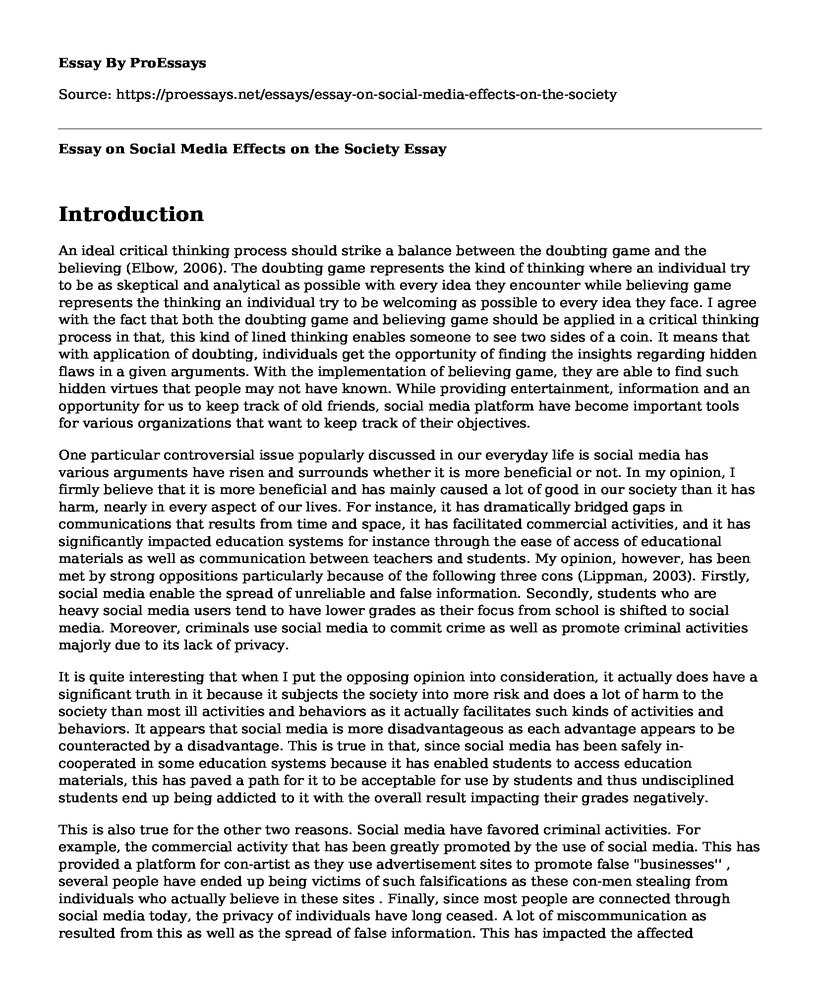Introduction
An ideal critical thinking process should strike a balance between the doubting game and the believing (Elbow, 2006). The doubting game represents the kind of thinking where an individual try to be as skeptical and analytical as possible with every idea they encounter while believing game represents the thinking an individual try to be welcoming as possible to every idea they face. I agree with the fact that both the doubting game and believing game should be applied in a critical thinking process in that, this kind of lined thinking enables someone to see two sides of a coin. It means that with application of doubting, individuals get the opportunity of finding the insights regarding hidden flaws in a given arguments. With the implementation of believing game, they are able to find such hidden virtues that people may not have known. While providing entertainment, information and an opportunity for us to keep track of old friends, social media platform have become important tools for various organizations that want to keep track of their objectives.
One particular controversial issue popularly discussed in our everyday life is social media has various arguments have risen and surrounds whether it is more beneficial or not. In my opinion, I firmly believe that it is more beneficial and has mainly caused a lot of good in our society than it has harm, nearly in every aspect of our lives. For instance, it has dramatically bridged gaps in communications that results from time and space, it has facilitated commercial activities, and it has significantly impacted education systems for instance through the ease of access of educational materials as well as communication between teachers and students. My opinion, however, has been met by strong oppositions particularly because of the following three cons (Lippman, 2003). Firstly, social media enable the spread of unreliable and false information. Secondly, students who are heavy social media users tend to have lower grades as their focus from school is shifted to social media. Moreover, criminals use social media to commit crime as well as promote criminal activities majorly due to its lack of privacy.
It is quite interesting that when I put the opposing opinion into consideration, it actually does have a significant truth in it because it subjects the society into more risk and does a lot of harm to the society than most ill activities and behaviors as it actually facilitates such kinds of activities and behaviors. It appears that social media is more disadvantageous as each advantage appears to be counteracted by a disadvantage. This is true in that, since social media has been safely in-cooperated in some education systems because it has enabled students to access education materials, this has paved a path for it to be acceptable for use by students and thus undisciplined students end up being addicted to it with the overall result impacting their grades negatively.
This is also true for the other two reasons. Social media have favored criminal activities. For example, the commercial activity that has been greatly promoted by the use of social media. This has provided a platform for con-artist as they use advertisement sites to promote false "businesses'' , several people have ended up being victims of such falsifications as these con-men stealing from individuals who actually believe in these sites . Finally, since most people are connected through social media today, the privacy of individuals have long ceased. A lot of miscommunication as resulted from this as well as the spread of false information. This has impacted the affected individual negatively and has presented itself as stress, trauma and well as suicide.
Conclusion
The above discussions clearly illustrate the importance of applying the doubting game and believe game when an individual encounter a situation that requires critical thinking. As a result, an individual can acquire an additional act of judgment and commitment. Therefore, this kind of thinking should be comprehensively taught and developed (Gerald, 2003).
Reference
Elbow, P. (2006). The believing game and how to make conflicting opinions more fruitful. Nurturing the peacemakers in our students: A guide to teaching peace, empathy, and understanding, 16-25.
Graff, Gerald. Clueless in Academe: How Schooling Obscures the Life of the Mind. New Haven: Yale UP, 2003.
Lippman, Walter. "The Indispensable Opposition." Atlantic Monthly (August 1939). It's notable that this essay is canonized in many editions of The Norton Reader (e.g., in the 6th edition, pages 850-55).
Cite this page
Essay on Social Media Effects on the Society. (2022, Mar 11). Retrieved from https://proessays.net/essays/essay-on-social-media-effects-on-the-society
If you are the original author of this essay and no longer wish to have it published on the ProEssays website, please click below to request its removal:
- The Facebook's Emotional Contagion Study
- Handling a Well Sorted Out Application Letter
- Should Adderall Be Used as a Performance Enhancing Drug for College Students?
- Medea the Play Essay Example
- Self-Awareness Paper Example
- U.S. School Dropouts: Uncovering Causes of an American Crisis
- Technological Advancements in Translation and Interpreting: A Decade of Progress - Research Paper







